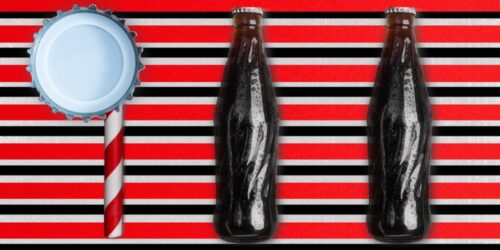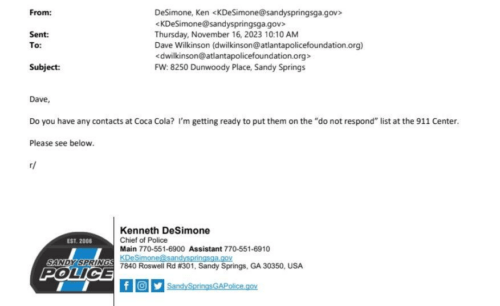1.19.24 – Appen Media

SANDY SPRINGS, Ga. — A dispute involving police and a manager at the Atlanta North Metro Coca-Cola Bottling Company on Dunwoody Place has sparked questions about the existence of a “do not respond” list at the 911 Center in Sandy Springs.
While Police Chief Kenneth DeSimone explicitly references the list in a Nov. 2023 email to the president of the Atlanta Police Foundation, interviews and records obtained by Appen Media indicate the city has no such thing.
Late last year, Sandy Springs Police officers were instructed to patrol companies that support the Atlanta Police Foundation after a Nov. 13 clash between law enforcement and several hundred opponents of Atlanta’s proposed public safety training center in DeKalb County.
That assignment went sour Nov. 14 when a Sandy Springs patrolman reported in an email that while conducting a business check at the Coca-Cola facility at 8250 Dunwoody Place, he was asked to leave the premises.
Through an open records request, Appen Media received emails detailing the incident through the department’s chain of command.
The officer said in an email to a lieutenant that while he was sitting in his patrol vehicle, he was approached by a warehouse manager who told him police were not allowed on the premises “due to it being private property.”
He told the manager he was sent to check the location due to threats against companies that support the Atlanta Police Foundation.
The manager then “insisted” the officer leave the property, according to the email.
Documents obtained through the open records request show the officer’s account of the incident was sent to Lt. Matthew McGinnis, Capt. Andrew Spears and Deputy Police Chief Craig Chandler.
In the emails, Sandy Springs Police personnel voiced frustration about how the officer was treated at the Coca-Cola facility.
Records show Deputy Chief Chandler forwarded the email thread to Police Chief DeSimone, suggesting “someone at APF might want to reach out to Coke executives” about the incident.
A Nov. 16 email from the chief to Dave Wilkinson, president and CEO of the Atlanta Police Foundation, shares the suggestion and references the “do not respond” list.

“Do you have any contacts at Coca Cola?” Chief DeSimone asked in the email. “I’m getting ready to put them on the ‘do not respond’ list at the 911 center.”

Whether or not that list exists is unclear.
The City of Sandy Springs denied an Open Records Act request for the list, stating it had no responsive documents.
Sandy Springs Interim Communications Director Dan Coffer says the city previously used a “no response” list to reduce the number of false alarm calls.
That practice changed five years ago with a revision to the city’s alarm ordinance, he said.
Police departments throughout the country cite false alarms as a major problem, saying they strain vital resources and manpower.
Like surrounding municipalities, Sandy Springs has adopted various alarm policies to combat the issue. The current ordinance requires alarm companies to register their customers, pay fines for false alarms and take certain steps before calling 911.
When a burglar alarm is triggered, companies must “verify” the emergency using audio, video or in-person signals before dialing authorities for help.
The city added the verification requirement in 2018.
The last time the ordinance changed was 2019, when the City Council voted to allow alarm companies 24 hours to supply the verification evidence.
When asked about the chief’s “‘do not respond’ list at the 911 Center” remark, Coffer said the city had such a document before implementing the verification requirement, but it is no longer in use.
“The ‘no response’ list was used when we responded to all alarms without verification,” he said.
“We no longer have a ‘no response’ list for alarms or alarm sites.”
Appen Media contacted Coca-Cola United, the local bottler that operates the plant on Dunwoody Place, for comment.
“We have the utmost respect for the Sandy Springs Police Department and their duty to serve and protect the communities in which we operate,” spokeswoman Cassandra Mickens said in a statement. “We have addressed this matter directly with the police department and our associates and have no further comment.”
City officials could offer no additional details as of press time, and it is unclear why the chief referred to a “do not respond” list that the city says no longer exists.
“Chief is out of town, and I haven’t had a chance to talk to him about this,” Coffer said Jan. 17. “We no longer have our ‘do not respond’ list.”
